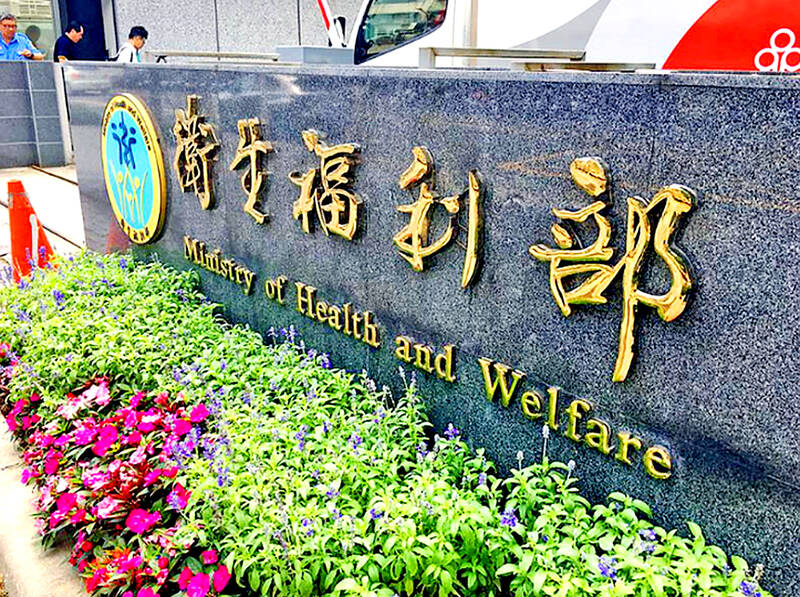The Ministry of Health and Welfare on Friday officially renamed mpox in Mandarin to avoid stigma associated with its previous name in accordance with a WHO decision to phase out the term “monkeypox.”
From Feb. 1, the Mandarin name for the disease is to be mpox (M痘), the ministry said.
In early May 2022, mpox cases in countries where the disease is not endemic began to increase, and on Nov. 28 that year, the WHO announced that it would use the term mpox to avoid “racist and stigmatizing language” associated with monkeypox.

Photo: Lin Hui-chin, Taipei Times
The global health body said it would use mpox as a synonym for monkeypox immediately, while both terms would be used simultaneously for a year until monkeypox is phased out.
Although the Centers for Disease Control (CDC) adopted the new English name mpox when referring to the disease, the Mandarin name monkeypox (猴痘) remained.
CDC Deputy Director-General Philip Lo (羅一鈞) yesterday said the centers passed a resolution to rename the disease at an mpox prevention and response meeting on Sept. 22 last year.
The resolution was published with a comment period from Nov. 3 last year to Jan. 2, Lo said.
As the ministry received no public comments opposing the proposal, it officially adopted the change on Friday, he said.
The change would not affect reporting rules or time limits for reporting the category 2 notifiable communicable disease, as the name in guidelines is being modified, he added.
Since mpox was classified as a category 2 notifiable communicable disease on June 23, 2022, 359 cases — 340 local and 19 imported cases — have been reported.
No mpox cases have been reported in Taiwan for nine weeks, since Nov. 13 last year, Lo said.
As WHO guidelines state that the disease can only be considered eliminated after three months of no new local cases under adequate surveillance, the CDC would need to monitor the disease until the middle of next month to confirm its elimination, he said.
As of Monday, 73,275 people had been vaccinated against mpox, including 45,606 people who are fully vaccinated with two doses, he said, adding that the CDC has about 25,000 doses in reserve, and those who only received one dose are encouraged to get the second dose for better protection.

Seventy percent of middle and elementary schools now conduct English classes entirely in English, the Ministry of Education said, as it encourages schools nationwide to adopt this practice Minister of Education (MOE) Cheng Ying-yao (鄭英耀) is scheduled to present a report on the government’s bilingual education policy to the Legislative Yuan’s Education and Culture Committee today. The report would outline strategies aimed at expanding access to education, reducing regional disparities and improving talent cultivation. Implementation of bilingual education policies has varied across local governments, occasionally drawing public criticism. For example, some schools have required teachers of non-English subjects to pass English proficiency

‘FORM OF PROTEST’: The German Institute Taipei said it was ‘shocked’ to see Nazi symbolism used in connection with political aims as it condemned the incident Sung Chien-liang (宋建樑), who led efforts to recall Democratic Progressive Party (DPP) Legislator Lee Kun-cheng (李坤城), was released on bail of NT$80,000 yesterday amid an outcry over a Nazi armband he wore to questioning the night before. Sung arrived at the New Taipei City District Prosecutors’ Office for questioning in a recall petition forgery case on Tuesday night wearing a red armband bearing a swastika, carrying a copy of Adolf Hitler’s Mein Kampf and giving a Nazi salute. Sung left the building at 1:15am without the armband and apparently covering the book with a coat. This is a serious international scandal and Chinese

TRADE: The premier pledged safeguards on ‘Made in Taiwan’ labeling, anti-dumping measures and stricter export controls to strengthen its position in trade talks Products labeled “made in Taiwan” must be genuinely made in Taiwan, Premier Cho Jung-tai (卓榮泰) said yesterday, vowing to enforce strict safeguards against “origin laundering” and initiate anti-dumping investigations to prevent China dumping its products in Taiwan. Cho made the remarks in a discussion session with representatives from industries in Kaohsiung. In response to the US government’s recent announcement of “reciprocal” tariffs on its trading partners, President William Lai (賴清德) and Cho last week began a series of consultations with industry leaders nationwide to gather feedback and address concerns. Taiwanese and US officials held a videoconference on Friday evening to discuss the

PERSONAL DATA: The implicated KMT members allegedly compiled their petitions by copying names from party lists without the consent of the people concerned Judicial authorities searched six locations yesterday and questioned six people, including one elderly Chinese Nationalist Party (KMT) member and five KMT Youth League associates, about alleged signature forgery and fraud relating to their recall efforts against two Democratic Progressive Party (DPP) legislators. After launching a probe into alleged signature forgery and related fraud in the KMT’s recall effort, prosecutors received a number of complaints, including about one petition that had 1,748 signatures of voters whose family members said they had already passed away, and also voters who said they did not approve the use of their name, Taipei Deputy Chief Prosecutor